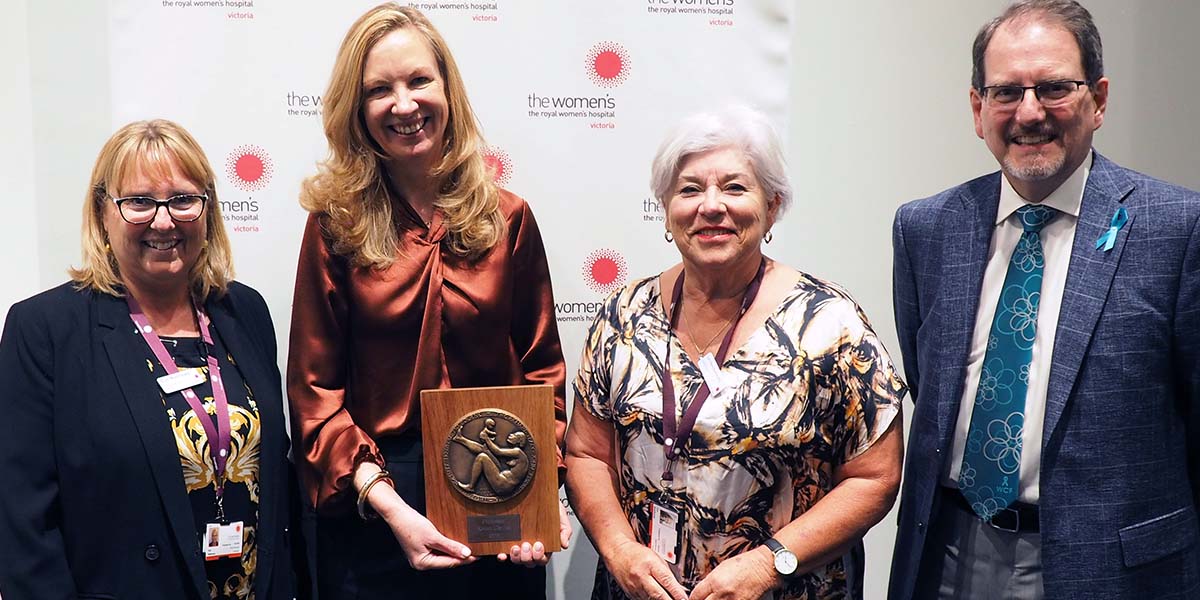
Professor Karen Canfell, Director of Cancer Research at Cancer Council NSW and Adjunct Professor at the University of Sydney, presented the Royal Women’s Hospital’s 2019 Tracy Maund Oration on Thursday 24 October.
The annual Oration is delivered in honour of the Women’s two founders, Dr Richard Tracy and Dr John Maund, and attracts audiences from across the Parkville biomedical precinct.
Professor Canfell, who recently returned from the World Cancer Leaders' Summit in Kazakhstan, spoke about progress in the global fight against cervical cancer.
She applauded the efforts of the large Australian team, including researchers and clinicians from the Women’s, who had contributed to the success of the Human Papillomavirus vaccine program in Australia and the flow-on advocacy work in other countries.
“Australia is actually on track to grant cervical cancer official “rare cancer” status within the next few years,” Professor Canfell told the audience.
“Our modelling predicts that Australia will reach a lower threshold of four cervical cancer cases per 100,000 women in 2028. This is the threshold that the World Health Organization is considering for designated cervical cancer ‘eliminated as a public health problem’.”
While boys and girls are now routinely vaccinated from the age of 12-13 years through Australia’s National HPV Vaccination Program, Professor Canfell said the burden of disease remains high in low to middle-income countries, where cervical cancer remains a leading cause of death.
She said in 42 countries, cervical cancer was the most common cause of cancer death in women.
While Australia has seen extraordinary success through a three-step approach of vaccination, screening and high quality treatment for cervical cancer, Professor Canfell said the challenge was to upscale vaccination to female adolescents and screening programs to women globally.
“It’s going to require extraordinary collaboration from NGOs, governments, the private sector and the research community to massively, successfully scale-up vaccination, screening and treatment. It’s not an insignificant challenge,” she said.
The World Health Organization’s draft strategic plan for cervical cancer elimination will be presented at the World Health Assembly in 2020. It proposes 90 per cent vaccine coverage in adolescent girls and 70 per cent screening coverage for twice-lifetime screening in adult women by 2030. This would be key to achieving the UN Sustainable Development Goal as it applies to cervical cancer - a one-third reduction in mortality from cervical cancer by 2030.
During the evening, the Women’s medical awards were also presented.
The Rex Betheras Prize, named in honour of esteemed neonatologist Rex Betheras, is awarded to a doctor training as a neonatal specialist, who has made a significant contribution to the clinical or academic achievements of the Women’s intensive and special care nurseries. This year the prize was awarded to Dr Anna Tottman.
The University of Melbourne Medical Student Awards, that celebrate the continuation of a strong collaboration between the Royal Women’s Hospital and the University of Melbourne School of Medicine, recognise talented students in reproductive medicine, neonatal paediatrics and women’s health.
The Ian Johnston Prize in Reproductive Medicine/Biology, named after the ‘founding father of IVF’ the late Dr Ian Johnston AM, is awarded to the best final year student in reproductive medicine/biology. The 2019 prize was awarded to Shannon Twomey.
The Dr Kate Campbell Prize for Neonatal Paediatrics is awarded to the best student in neonatal paediatrics who trained at the Women’s in the past year. The 2019 prize was awarded to Shweta Saraf.
The Edgar and Mabel Coles Prize for Women’s Health is awarded to the best final year student in obstetrics, who trained at the Women’s the previous year. The 2019 prize was awarded to Winston Dzau.